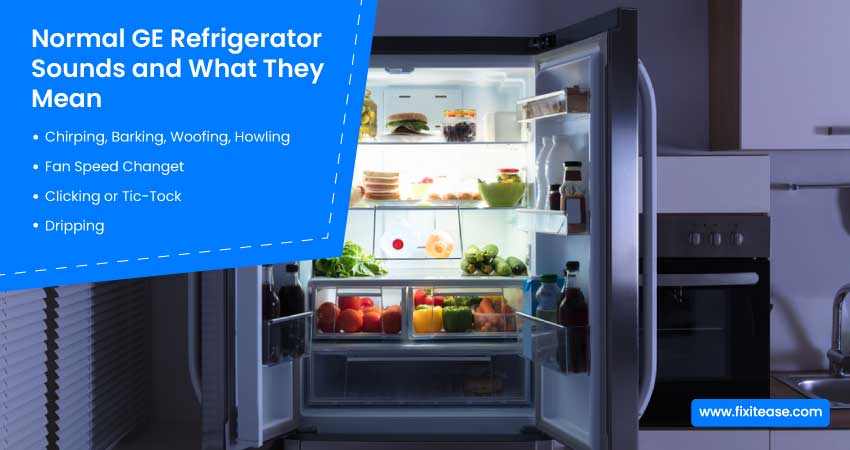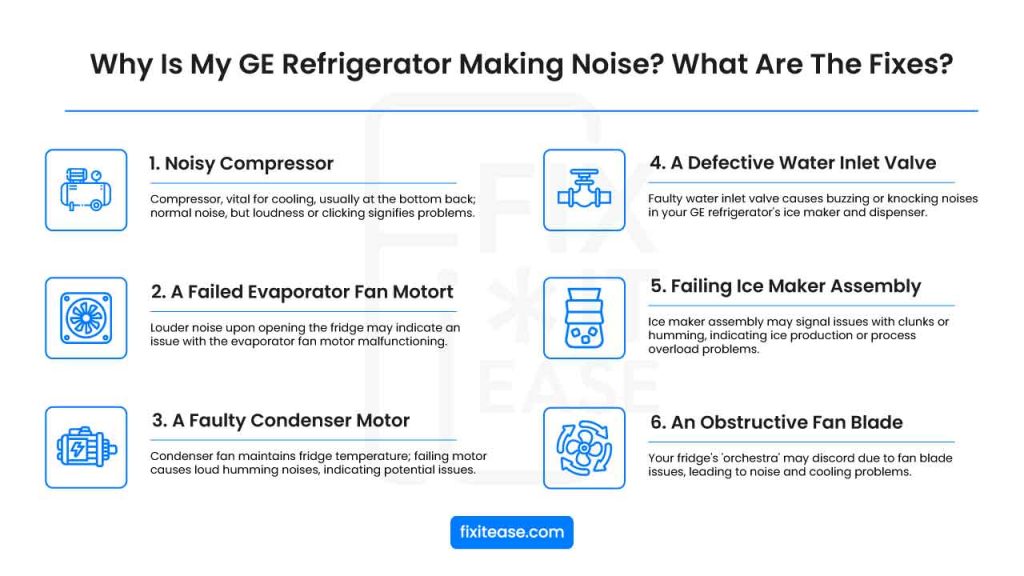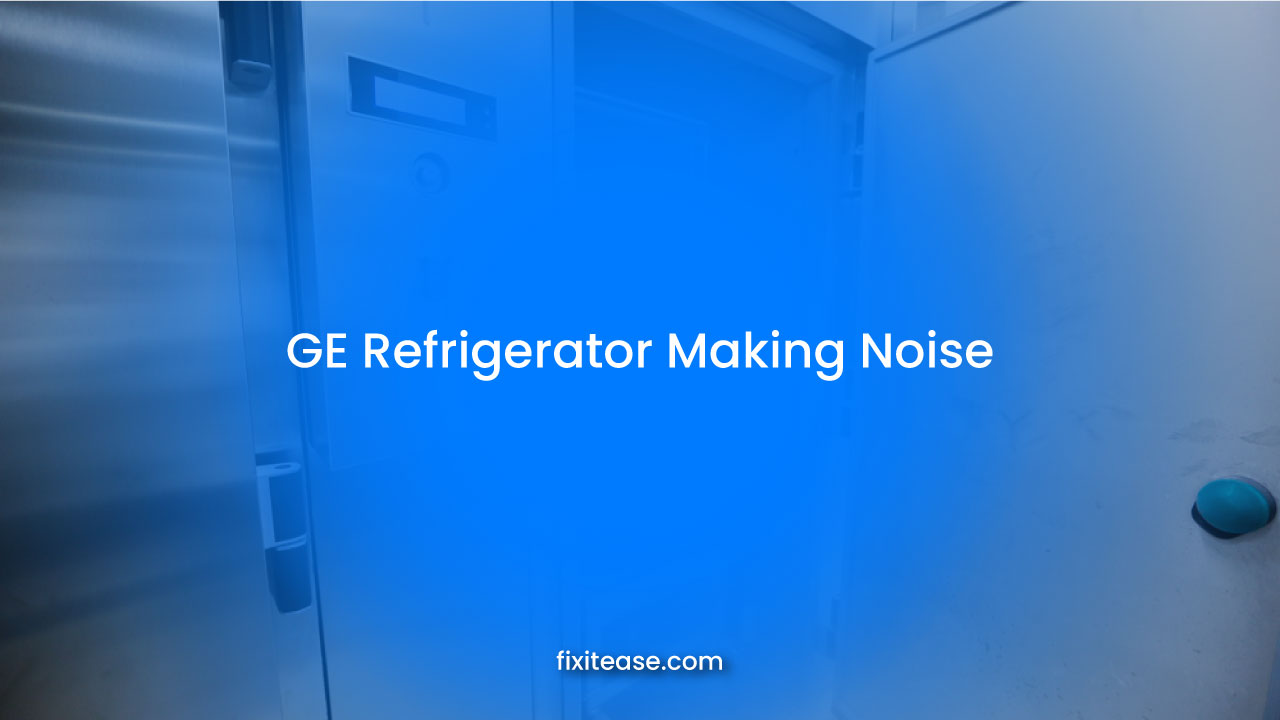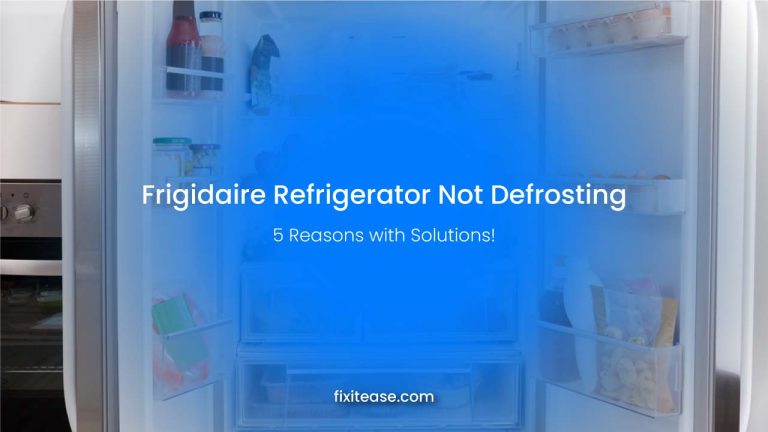Why Is My GE Refrigerator Making Noise? Smart & Easy Solutions!
A GE refrigerator can act weird sometimes. You may hear chirping, howling, or humming sounds all of a sudden and be worried. Don’t fret, there are some key reasons why a GE refrigerator makes noise and if you identify them, you can solve this issue in no time.
The most common reasons for a GE refrigerator making noise are a noisy compressor, a failed evaporator fan motor, a faulty condenser motor, a defective water inlet valve, a failed ice maker, or an obstructive fan blade.
Keep reading to know the details about the problems and how you can solve them.
Normal GE Refrigerator Sounds and What They Mean

Not all kinds of noises indicate a faulty or damaged GE refrigerator. There are some common and normal noises that are harmless for your fridge. So, before we get into the noises that you should worry about, let’s get to know about the normal ones first.
- Chirping, Barking, Woofing, Howling: At times, you might hear these peculiar sounds that could resemble animal noises. Fear not, it’s just the damper door opening and closing to maintain the ideal temperature inside your fridge.
- Fan Speed Change: If you notice the fan’s speed fluctuating, don’t fret. Your refrigerator is simply responding to temperature changes resulting from frequent door openings. It’s an energy-efficient feature.
- Clicking or Tic-Tock: The rhythmic ticking sound is not a cause for concern. It’s the defrost timer doing its job, cycling on and off to keep your freezer frost-free.
- Dripping: The sound of dripping is often heard as defrost water drips into the drain pan beneath the refrigerator. This is a part of the regular defrosting process.
Why Is My GE Refrigerator Making Noise? What Are The Fixes?

So, if you notice some loud noises that are not similar to what we discussed above, there could be some serious issues with your GE refrigerator. Here are the reasons for unusual noises, what they mean, and how you can fix them.
1. Noisy Compressor
The compressor is the powerhouse of your refrigerator’s cooling system. It’s typically located at the back near the bottom. While it’s perfectly normal for your compressor to produce some noise as it cycles on and off to maintain the desired temperature, an unusually loud, persistent noise, or humming and clicking sounds that accompany it might signal an issue.
What Causes It:
- Worn-out Internal Components: Over time, the internal components of the compressor can wear out, resulting in more noise than usual.
- Dirty Condenser Coils: Dirty condenser coils can lead to overheating of the compressor, causing it to work harder and generate extra noise.
- Defective Start Relay: If the start relay (which is responsible for kickstarting the compressor) is faulty, it can also contribute to compressor noise.
How to Identify It:
To identify if the noise is indeed coming from the compressor, listen for any unusual sounds emanating from the compressor area. If you can confirm that the compressor is the source of the noise, you need to address the issue promptly.
How to Fix It:
- Clean the Condenser Coils: If dirty condenser coils are the culprit, you can address this issue yourself. Follow the manufacturer’s instructions to clean the coils, which should reduce the strain on the compressor and the accompanying noise.
- Replace the Start Relay: If the issue lies with the start relay, you need to replace the component. Ensure you have the right replacement part and follow the manufacturer’s guidelines or seek professional help.
- Replace the Compressor: Unfortunately, if the compressor’s internal components are worn out, it’s recommended to replace the entire compressor unit. It’s best to consult a professional while replacing the compressor because it requires expertise. Keep in mind that replacing the compressor can be costly, so it might be worth considering a new refrigerator, especially if your existing one is quite old.
How to Prevent It:
- Ensure regular maintenance, including cleaning coils and checking for worn components.
- Avoid overloading your refrigerator as this can strain the compressor.
2. A Failed Evaporator Fan Motor
If you notice that the noise becomes louder when you open the fridge, maybe there’s something wrong with the evaporator fan motor. The evaporator fan motor circulates air over the evaporator coils to maintain cool temperatures. When this motor begins to malfunction, it can create a humming noise.
What Causes It:
- Bearing Wear and Tear: The most common reason for motor failure is wear and tear on the bearings, which can seize up over time, leading to motor failure.
- Obstructed Blades: Another possibility is obstructions in the fan blades, preventing them from turning properly.
How to Identify It:
To pinpoint a failed evaporator fan motor, focus on the noise’s location. If it becomes notably louder when the refrigerator door opens, there’s a high chance that the evaporator fan motor is the source.
How to Fix It:
- Unplug and Access: Start by unplugging your GE refrigerator from the power source and moving it away from the wall for easier access.
- Disconnect the Motor: Identify the evaporator motor at the back of your fridge and disconnect it from the wires that connect to it.
- Multimeter Testing: Use a multimeter to test the fan motor for continuity. If the multimeter indicates a lack of continuity, it’s a clear sign of motor malfunction and necessitates replacement.
- Consider Compatible Replacements: For replacing the evaporator fan motor, consider options like the GE Refrigerator Evaporator Fan Motor, which may be compatible with your GE refrigerator model.
- Reassembly and Testing: After replacing the fan motor, reassemble the necessary components, and power on your refrigerator to check if the loud humming noise has ceased.
How to Prevent It:
- Maintain regular cleaning and inspection of the fan blades to ensure unobstructed operation.
- Keep an eye out for any early signs of motor wear and tear, and consider timely replacement if needed.
3. A Faulty Condenser Motor
A condenser fan motor is responsible for maintaining the temperature within your refrigerator by circulating air over the condenser coils. When this motor begins to fail, it can express its displeasure through loud humming noises.
What Causes It:
- Dirt and Debris Buildup: The most common cause of condenser motor failure is the accumulation of dirt and debris on the fan blades. This buildup can lead to overheating and eventual motor failure.
- Bearing Wear and Tear: Over time, the bearings within the motor can wear out, causing them to seize up and the motor to fail.
How to Identify It:
Your GE refrigerator makes a humming noise when there’s a faulty condenser. You may ask, how can I distinguish the noise from a noise produced by a faulty evaporator motor?
Don’t get confused. In both cases, there will be a humming sound but if the sound comes from the back of your refrigerator, it’s because of a failed condenser fan motor.
How to Fix It:
- Access the Motor: Unplug your refrigerator from the power source and move it away from the wall to gain access to the motor.
- Unplug and Disconnect: Identify the condenser fan motor at the back of your refrigerator and disconnect it from the power source.
- Multimeter Testing: To test the motor’s continuity, use a multimeter. If it shows no continuity, it’s a clear sign of motor failure and the need for replacement.
- Consider Compatible Replacements: To replace the faulty motor, consider options like the GE WR60X10220 Condenser Fan Motor, which is compatible with various GE refrigerator models.
How to Prevent It:
- Ensure no obstructions are blocking the blades from spinning freely.
- Address any debris accumulation, accumulated dust, or stray ice that might hinder the fan’s movement.
4. A Defective Water Inlet Valve
The water inlet valve inside your refrigerator regulates the flow of water from your home’s supply to the ice maker and water dispenser. When this valve gets faulty, it often expresses its discontent with an unpleasant buzzing or knocking noise in your GE refrigerator.
What Causes It:
- Mineral Buildup: Over time, mineral deposits from your water supply may accumulate in the valve, creating obstructions, limiting water flow, and giving rise to noise.
- Electrical Hiccups: Issues with the electrical connection or the valve itself can lead to dysfunction, resulting in the notorious hum or buzz that irks your ears.
How to Identify It:
Pay attention to the timing and intensity of the noise to identify this issue. If the clamour peaks during the ice-making process, chances are the water inlet valve is the source of the racket.
How to Fix It:
- Track Down the Valve: Locate the water inlet valve, commonly situated on the bottom-left side of your GE refrigerator. For precise guidance, consult your trusty GE fridge manual.
- Expose the Valve: Carefully remove the back cover on the bottom-left side of your refrigerator to unveil the water inlet valve.
- Listen Closely: When the refrigerator is in operation, listen for any conspicuous noise originating from the valve. If it’s notably loud, it’s a sign that the valve may be obstructed and in need of replacement.
- Installation: After confirming the need for a fresh valve, shut off your refrigerator, disconnect the old valve, and expertly install the replacement. Don’t forget to reconnect the water line.
- Final Check: Post-installation, turn the water supply back on, plug in your fridge, and meticulously inspect for any leaks or hiccups.
5. Failing Ice Maker Assembly
The ice maker assembly, which churns out ice, can sometimes throw a fit. If you hear sudden clunks or prolonged humming, it’s the ice maker’s way of signalling an issue, whether it’s related to ice production problems or an overload in the ice-making process.
What Causes It:
- Blocked Ice Maker Fan: The ice maker has its own fan, and if debris or ice accumulates around it, it can create a humming noise. If this is the source of the commotion, using a hairdryer to defrost the fan might do the trick.
- Malfunctioning Ice Maker Motor: A misbehaving motor inside the ice maker can also contribute to an unsettling humming or buzzing during operation. In such cases, you may need to replace the motor.
How to Identify It:
If your refrigerator seems to be turning into a concert hall during the ice-making routine, it’s often a sign that the ice maker’s drive motor or motor module isn’t cooperating. While for certain models, you can buy individual components, sometimes replacing the entire ice maker assembly may be necessary.
How to Fix It:
Dealing with a troublesome ice maker assembly can be a bit tricky. Here are your options for you:
- Replace The Component: Depending on your specific refrigerator model, you may purchase separate components like the drive motor or module. This can save you from replacing the whole assembly.
- Professional Assistance: This can be a complex task, so it’s better to seek help from a professional refrigerator repair service.
How to Prevent It:
- Ice Jam Prevention: Ice jams can happen due to frequent door openings or in hot conditions. Clear out the ice bucket regularly to maintain a smooth ice production process.
- Water Supply Connection: Make sure your ice maker is properly connected to the water supply. Skipping this step can result in an annoying hum that you’d rather avoid.
6. An Obstructive Fan Blade
Imagine your fridge as a music orchestra. If you hear a discordant note, it’s often due to a fan blade issue. These blades help maintain the right temperature, and when they encounter obstacles, the result can be dissonance in the form of noise and improper cooling.
What Causes It:
- Blocked Fan Blades: Whether in the evaporator or condenser, accumulated debris or ice can hinder the free movement of the fan blades, leading to disruptive humming sounds. If this is the case, you’ll need to clear the obstruction.
How to Identify It:
If your refrigerator is suddenly making unusual sounds, particularly when you open one of the doors. First, focus on the evaporator fan blade located in the freezer behind the back panel. Try to rotate it by hand. If it’s not moving freely, check for any obstructions or foreign objects.
How to Fix It:
- Check for any obstruction and remove it: If you find that an obstruction is affecting either the evaporator or condenser fan blade, remove it carefully. The goal is to ensure that these blades can move freely to maintain the refrigerator’s desired temperature.
FAQs
Why is my GE freezer making a loud sound?
Your GE freezer may be making a loud sound due to a few common issues. First, check if the noise is caused by the evaporator or condenser fan blades. If they’re obstructed by debris or ice, remove the obstructions. Another reason could be a malfunctioning icemaker or a faulty water inlet valve. If the noise persists, it’s best to consult a professional technician for a thorough diagnosis and repair.
How do I know if my evaporator fan is working?
To check if your evaporator fan is working, listen for a gentle whirring sound when your refrigerator’s compressor is running. If you don’t hear it, open the freezer and hold the door switch while feeling for airflow. Lack of sound and air movement could indicate a faulty fan that needs replacing.
Last Words
So, yes, your GE refrigerator can make noise due to a faulty condenser fan motor, evaporator fan, water inlet valve, or ice maker assembly. By diagnosing the issue and taking necessary actions, you can bring back peace to your kitchen. Regular maintenance, keeping components free of obstructions, and ensuring proper connections can help prevent such disruptions in the future, ensuring your refrigerator functions quietly and efficiently.







